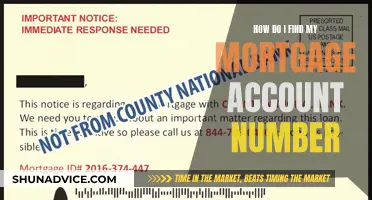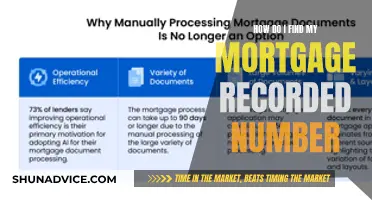
As a homeowner, there are several reasons you may need to know who owns your mortgage. This is known as the mortgage holder, and they have the legal right to enforce the loan agreement. Finding out who owns your mortgage isn't always straightforward, as your loan may have been sold multiple times, and the company you send your monthly payments to may not be the owner. To find out who owns your mortgage, you can contact your loan servicer, who is required to provide you with the name, address, and telephone number of the owner. You can also use online tools such as the Fannie Mae and Freddie Mac lookup tools, or the MERS lookup tool.
| Characteristics | Values |
|---|---|
| How to find out who owns your mortgage | Contact your loan servicer, who is required to provide the name, address, and telephone number of the owner of your loan |
| Use online tools provided by Freddie Mac or Fannie Mae to find out if your loan is owned by either entity | |
| Check for your mortgage servicer on the Mortgage Electronic Registration Systems (MERS) website | |
| Check your monthly mortgage statements to find the phone number for your servicer | |
| Send a written request to your mortgage servicer | |
| If you have a USDA RHS-guaranteed loan, check your closing documents from when you took out the loan | |
| Reasons to find out who owns your mortgage | Seeking basic information about your loan account |
| You've fallen behind on your payments and want to discuss alternatives to foreclosure | |
| You're having trouble making monthly mortgage payments and want to take advantage of mortgage relief programs | |
| You're interested in learning more about other loss mitigation options |
What You'll Learn

Contact your mortgage servicer
Contacting your mortgage servicer is the simplest way to find out who owns your mortgage loan. The mortgage servicer is the agent of the mortgage holder and is responsible for collecting monthly payments, sending notifications, issuing late fees, dealing with your escrow account, handling your mortgage insurance, and managing the foreclosure process if you default on your mortgage loan.
Your mortgage servicer is required by law to provide you with the name, address, and telephone number of the owner of your loan. You can contact them via phone, email, or written request. If you opt for a written request, you can submit a Qualified Written Request (QWR) or a Request for Information. You can also find the contact information for your mortgage servicer on your monthly mortgage statement or the lender's website.
It's important to note that the company you send your mortgage payments to may not be the loan owner. Your mortgage loan may have been sold or transferred, and the new owner is required to notify you of any changes within 30 days. If you are facing foreclosure or are behind on your payments, it's crucial to contact your loan servicer to discuss alternatives and explore mortgage relief options.
Finding Your Wells Fargo Mortgage Account Number: A Guide
You may want to see also

Use online tools
There are several online tools that can help you find out who owns your mortgage. Firstly, you can search online for the contact details of your mortgage servicer. The servicer is required to provide you with the name, address, and telephone number of the owner of your loan. You can find the number for your mortgage servicer on your monthly mortgage statement or coupon book.
There are several online lookup tools that can help you find out who owns your mortgage. Fannie Mae and Freddie Mac, two of the largest owners of mortgage loans, both offer a mortgage lookup tool on their websites. You can also check for your mortgage servicer on the Mortgage Electronic Registration Systems (MERS) website. MERS is a national electronic registry system that tracks the changes in servicing rights and ownership interests in mortgage loans.
If you have a USDA loan, you can check the USDA Rural Development website for more information about these types of loans.
In addition to these resources, you can also try contacting the Consumer Financial Protection Bureau, the U.S. Department of Housing and Urban Development (HUD), or the various credit bureaus. These organizations have information and resources related to homeownership, real estate, loan servicing, and the mortgage market.
Finding Your Mortgage: Record Number Search Simplified
You may want to see also

Check your monthly mortgage statement
Your monthly mortgage statement will contain a lot of information, including the contact details of your mortgage servicer. The mortgage servicer is the entity that processes and handles loan tasks. This includes collecting monthly payments, sending notifications, issuing late fees, dealing with your escrow account, handling your mortgage insurance, and dealing with the foreclosure process if you default on your mortgage loan.
The mortgage servicer is usually a separate entity from the owner of the loan. The company you send your mortgage payments to might not be the loan owner, as mortgage debt can be sold to another entity, which then becomes the new loan owner. This is known as the mortgage holder or note holder, and they have the legal right to enforce the loan agreement.
If you need to know who owns your mortgage, you can contact your mortgage servicer, who is required by law to provide you with the name, address, and telephone number of the owner of your loan. You can also submit a Qualified Written Request or a Request for Information.
It's important to know who owns your loan, especially if you want to refinance your home, ask for a loan modification, or request forbearance if your monthly payments have become unmanageable.
PNC Mortgage: Finding and Understanding Your Payoff Amount
You may want to see also

Submit a written request
If you want to find out who owns your mortgage, you can submit a written request to your mortgage servicer. The mortgage servicer is the agent of the mortgage holder and is responsible for collecting monthly payments, sending notifications, issuing late fees, and dealing with your escrow account, mortgage insurance, and foreclosure process (if you default on your loan).
Your mortgage servicer is required by law to provide you with the name, address, and telephone number of the owner of your loan, to the best of their knowledge. You can submit a Qualified Written Request (QWR) or a request for information.
It's important to note that the company you send your mortgage payments to might not be the loan owner. Your mortgage loan may have been sold, and the owner of your loan may have changed. In such cases, the new owner is required to notify you within 30 days of the transfer.
You can find the contact information for your mortgage servicer on your monthly mortgage statement or the lender's website. Alternatively, you can check the Mortgage Electronic Registration Systems (MERS) website, which is a national electronic registry system that tracks changes in servicing rights and ownership interests in mortgage loans.
Finding Your Mortgage History: A Step-by-Step Guide
You may want to see also

Consult a foreclosure lawyer
If you're facing foreclosure, consulting a foreclosure lawyer is a good idea. They can help you prevent foreclosure and keep your home. A foreclosure lawyer can advise you about what mortgage relief is available in your circumstances, help you deal with your loan servicer, and represent you in a foreclosure, if necessary.
The foreclosure process is complicated, and lenders can make mistakes or intentionally violate the law. A foreclosure attorney will be able to identify this and help you assert your legal defenses at the right time and in the right way. They can also help you understand your legal rights and the steps in the foreclosure process in your state.
If you receive a breach letter, consider hiring an attorney, especially if you can't catch up on your payments but want to keep your home. Once the foreclosure officially starts, your lawyer will have limited time to take the steps needed to defend against the proceeding. You could miss an important deadline if you wait too long to hire an attorney.
If you can't afford to hire a lawyer to represent you throughout the entire process, consider scheduling a consultation with one to get advice about your options, rights, and responsibilities. You can probably get a free consultation to better understand your situation, and there are also free resources available from HUD-approved housing counselors.
Finding Assumable Mortgages: Strategies for Success
You may want to see also
Frequently asked questions
Finding out who owns your mortgage isn't always straightforward. Your mortgage loan might have been sold, and the company you send your mortgage payments to may not be the owner of the underlying debt. The first step to finding out who owns your mortgage is to contact your servicer. Your servicer is required to provide you with the name, address, and telephone number of the owner of your loan.
A mortgage servicer is an entity that processes and handles loan tasks. While in some instances, your mortgage servicer may be the same company that owns your mortgage, this is not always the case. The servicer's responsibility is to collect monthly payments, maintain escrow accounts, and distribute funds to other parties.
If you're having trouble making monthly mortgage payments, you can contact the owner of your mortgage to discuss mortgage relief programs like payment deferral or forbearance. You can also contact a HUD-approved housing counsellor for free information about different loss mitigation options and mortgage information.







